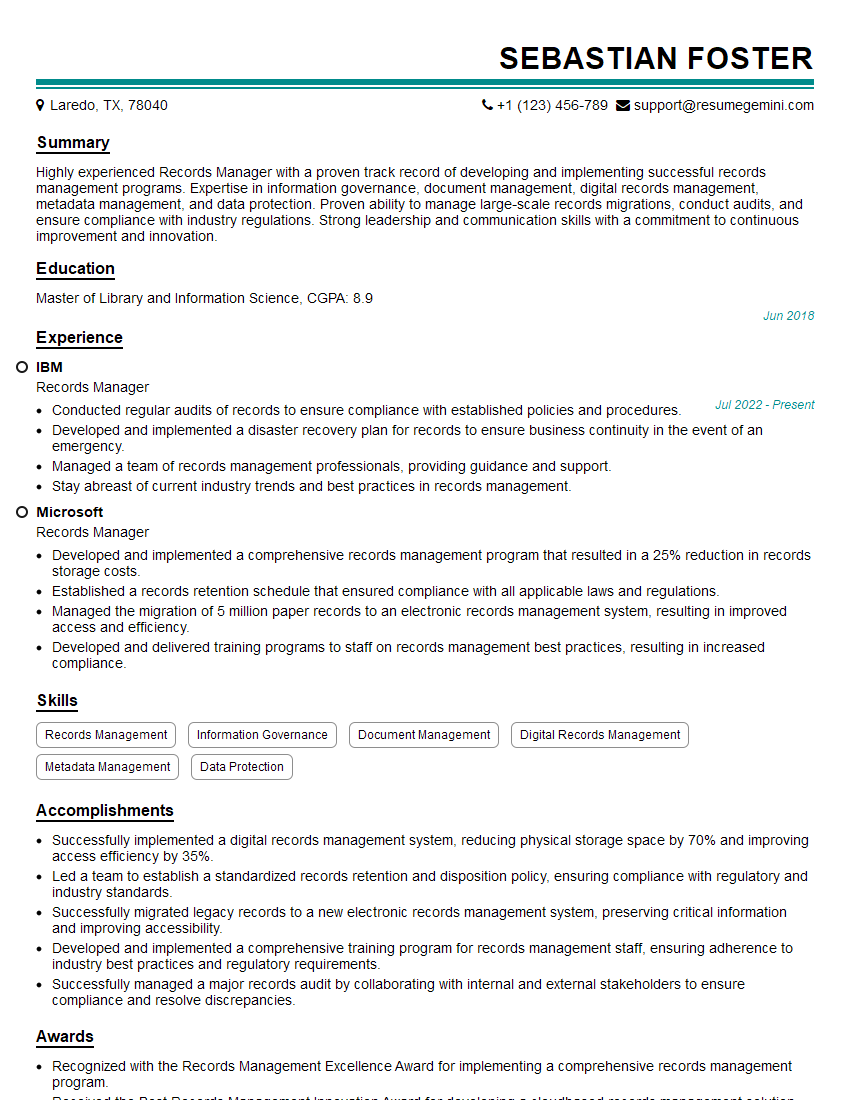Are you a seasoned Records Manager seeking a new career path? Discover our professionally built Records Manager Resume Template. This time-saving tool provides a solid foundation for your job search. Simply click “Edit Resume” to customize it with your unique experiences and achievements. Customize fonts and colors to match your personal style and increase your chances of landing your dream job. Explore more Resume Templates for additional options.

Sebastian Foster
Records Manager
Summary
Highly experienced Records Manager with a proven track record of developing and implementing successful records management programs. Expertise in information governance, document management, digital records management, metadata management, and data protection. Proven ability to manage large-scale records migrations, conduct audits, and ensure compliance with industry regulations. Strong leadership and communication skills with a commitment to continuous improvement and innovation.
Education
Master of Library and Information Science
June 2018
Skills
- Records Management
- Information Governance
- Document Management
- Digital Records Management
- Metadata Management
- Data Protection
Work Experience
Records Manager
- Conducted regular audits of records to ensure compliance with established policies and procedures.
- Developed and implemented a disaster recovery plan for records to ensure business continuity in the event of an emergency.
- Managed a team of records management professionals, providing guidance and support.
- Stay abreast of current industry trends and best practices in records management.
Records Manager
- Developed and implemented a comprehensive records management program that resulted in a 25% reduction in records storage costs.
- Established a records retention schedule that ensured compliance with all applicable laws and regulations.
- Managed the migration of 5 million paper records to an electronic records management system, resulting in improved access and efficiency.
- Developed and delivered training programs to staff on records management best practices, resulting in increased compliance.
Accomplishments
- Successfully implemented a digital records management system, reducing physical storage space by 70% and improving access efficiency by 35%.
- Led a team to establish a standardized records retention and disposition policy, ensuring compliance with regulatory and industry standards.
- Successfully migrated legacy records to a new electronic records management system, preserving critical information and improving accessibility.
- Developed and implemented a comprehensive training program for records management staff, ensuring adherence to industry best practices and regulatory requirements.
- Successfully managed a major records audit by collaborating with internal and external stakeholders to ensure compliance and resolve discrepancies.
Awards
- Recognized with the Records Management Excellence Award for implementing a comprehensive records management program.
- Received the Best Records Management Innovation Award for developing a cloudbased records management solution that enhanced security and accessibility.
- Honored with the Records Management Professional of the Year Award for contributions to the field and exemplary leadership.
- Recognized with the Information Governance Excellence Award for implementing a comprehensive information governance program that improved data management and security.
Certificates
- Certified Information Governance Professional (CIGP)
- Certified Records Manager (CRM)
- Certified Information Professional (CIP)
- Registered Records Analyst (RRA)
Career Expert Tips:
- Select the ideal resume template to showcase your professional experience effectively.
- Master the art of resume writing to highlight your unique qualifications and achievements.
- Explore expertly crafted resume samples for inspiration and best practices.
- Build your best resume for free this new year with ResumeGemini. Enjoy exclusive discounts on ATS optimized resume templates.
How To Write Resume For Records Manager
- Quantify your accomplishments with metrics and specific results to demonstrate your impact.
- Highlight your expertise in emerging technologies, such as electronic records management and data protection.
- Showcase your ability to collaborate with stakeholders across the organization to implement and enforce records management policies.
- Emphasize your commitment to professional development and staying up-to-date with industry best practices.
Essential Experience Highlights for a Strong Records Manager Resume
- Develop and implement comprehensive records management programs that optimize storage costs and improve efficiency.
- Establish and maintain records retention schedules to ensure compliance with legal and regulatory requirements.
- Manage the migration of paper and electronic records to digital records management systems, ensuring seamless access and preservation.
- Develop and deliver training programs to staff on records management best practices, fostering a culture of compliance.
- Conduct regular audits of records to assess compliance, identify areas for improvement, and mitigate risks.
- Develop and implement disaster recovery plans for records to protect business continuity in the event of emergencies.
Frequently Asked Questions (FAQ’s) For Records Manager
What is the primary role of a Records Manager?
A Records Manager is responsible for developing, implementing, and managing an organization’s records management program to ensure the proper creation, storage, retrieval, and disposition of records, both physical and electronic.
What are the key skills required for a Records Manager?
Key skills include records management, information governance, document management, digital records management, metadata management, data protection, and knowledge of industry regulations and standards.
What are the career advancement opportunities for a Records Manager?
Records Managers can advance to roles such as Information Governance Manager, Document Management Specialist, Digital Records Manager, or Chief Records Officer.
What industries are Records Managers typically employed in?
Records Managers are employed in various industries, including healthcare, finance, government, education, and legal.
What are the challenges faced by Records Managers?
Challenges include managing the increasing volume and complexity of records, ensuring compliance with regulations, protecting records from security breaches, and keeping up with technological advancements.
What are the benefits of effective records management?
Effective records management reduces storage costs, improves access to information, ensures compliance with regulations, protects against legal liabilities, and supports business continuity.